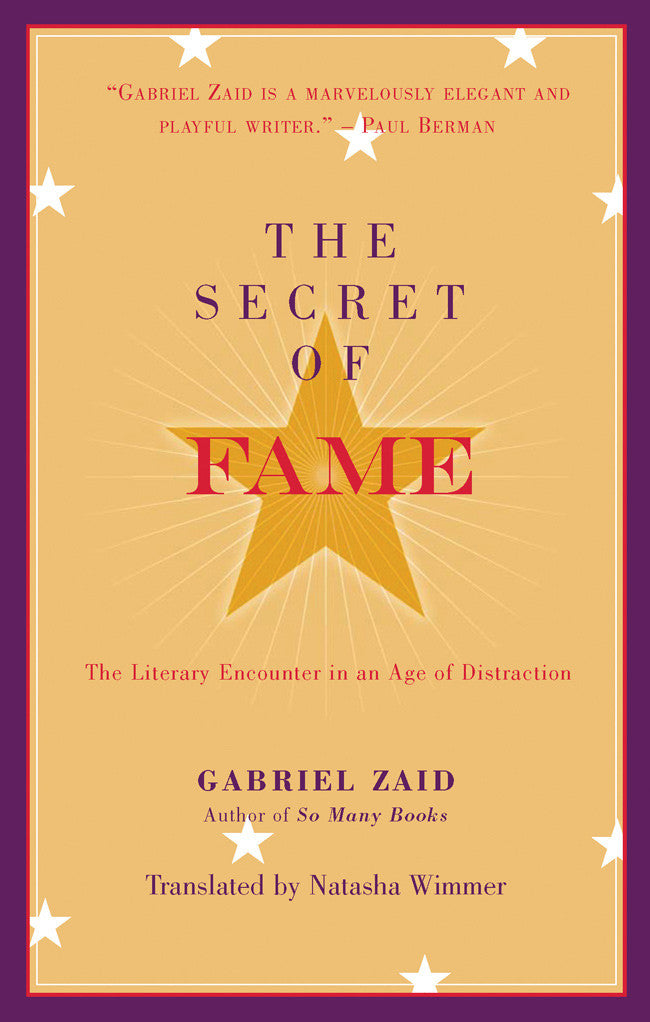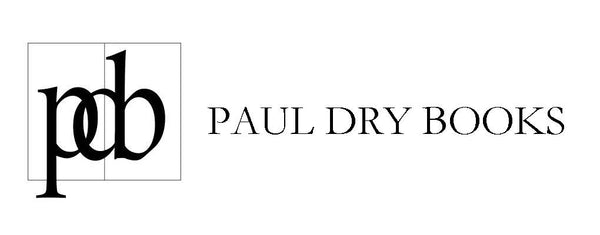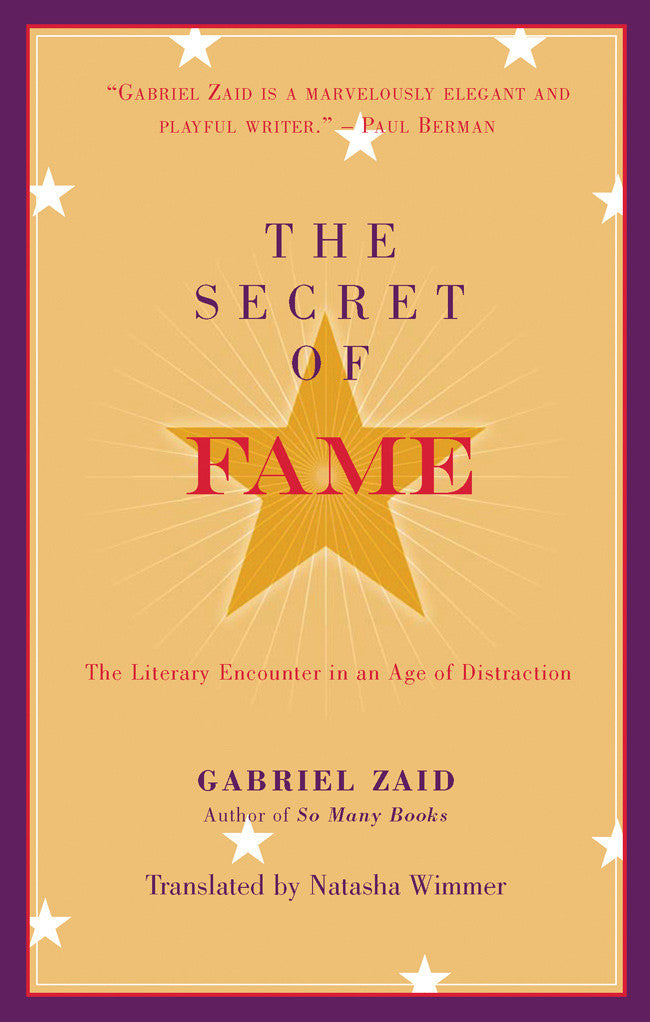The Secret of Fame
The Secret of Fame
Gabriel Zaid
Couldn't load pickup availability
The Secret of Fame: The Literary Encounter in an Age of Distraction / Translated from the Spanish by Natasha Wimmer / 182-page hardback / 4.5" x 7" / ISBN 978-1-58988-038-2 / Publication Date: May 2008
"Gabriel Zaid is a marvelously elegant and playful writer—a cosmopolitan critic with sound judgment and a light touch. He is a jewel of Latin American letters, which is no small thing to be. Read him—you'll see."—Paul Berman
In So Many Books, Gabriel Zaid explored the predicament in which all "unrepentant readers" find themselves today, when "the human race publishes a book every thirty seconds"—more books than any of us can even contemplate, much less read.
Now, in The Secret of Fame, this "playful celebrant of literary proliferation" (New Yorker) examines the methods and motivations of literary fame-seekers from ancient times to the present day. He shines a critical, yet humorous, light on today’s book world, whose denizens often find it "more interesting to talk about writers than to read them," and he takes a serious look at the desire for fame and the disillusionment that can engulf those who achieve it. Along the way, Zaid pokes fun at literary and scholarly traditions, including the unwritten rules of quoting other authors, the ascendancy of the footnote, and the practice of publishing "foolishly complete works."
More important to Zaid than the fame of a piece of writing or of its writer is the miracle of great writing. "Fame concentrates society's attention on a few names. This can be a good thing. It keeps us reading the great books, keeps us revisiting the great works of art. But fame can also be a bad thing. It keeps us focused on names, not the living experiences of great works," which "focus our minds, speak to the best in us, and spark our imagination." Though the hunger for fame is not going away, the deeper quest on the part of the maker (as writer, artist, actor, etc.) is to make us "feel more alive, more engaged in meaningful conversation with life." He concludes, "Nobody knows where masterpieces come from. Miracles are miracles. They catch us before we catch them. But we’re not trapped by them—we’re set free."
Also available as an ebook:
- Amazon
- Apple iTunes Bookstore
- Barnes & Noble
- Google Play
- Kobo (See IndieBound's list of independent booksellers selling e-books.)
Reviews
"Mr. Zaid's goal is to capture the variety of anxieties that beset literary fame-seekers, and he does so with a mocking cleverness. A serious theme, though, runs through his book—that with the possible exception of a few agonized painters and musicians, no one can quite touch the exquisite torment of the literary artist as he faces the hazards of fate."—Andrew Stark, Wall Street Journal (click for full review)
Excerpts from The Secret of Fame
"Reading, which is the center of literary life, is a mental and solitary activity, although it can be experienced as a dialogue, and even involve a certain physical liveliness. Jose Vasconcelos talked about books that we read standing up, that move us to act, take notes, consult a dictionary, see our surroundings with new eyes. To share that excitement, to talk about the experience of reading, about what a book says and how it says it, what you liked or what was disappointing, makes public and private life more intelligent. But there are other expanses of the literary world, some so peripheral that reading becomes superfluous. Or so hectic that there’s no time for reading. Paradoxically, the activities that dominate 'literary life' are those that flourish without anyone needing to read at all."
"The author can manage his literary name like a brand, with a whole line of products: books published under his name (but not necessarily entirely written by him), with all their subsidiary rights; as well as a line of services...There's no reason that toys, clothes, and many other things should be the sole province of characters like Harry Potter and Mickey Mouse. At the Günter Grass Museum, established with the participation of the writer, Günter Grass t-shirts or Günter Grass tin drums could surely be sold."
"Lively conversations can be struck up between strangers of very different backgrounds and cultures, with the most diverse interests. And yet a lively exchange is most easily sparked when people have some differences but also something in common: they’ve read the same book, listened to the same music, visited the same place, or seen the same film—though their perspectives are shaped by their divergent experiences, tastes, and opinions. Paradoxically, that’s why modern abundance can impoverish the conversation. The explosion in the number of books and records available, the places we’re able to visit, and the people we can get to know all make it harder to find common ground. On a long international flight, two readers seated next to each other may each have read hundreds of books without having read anything the other has."
"Literature existed before the I. The first texts were created before the emergence of writers. The first instance of creative consciousness may be attributed to the listener who hears a memorable phrase and recognizes the marvel produced by the randomness of talk. Reading, not writing, is in the origin of literature. It is texts and literature that develop consciousness, through the reading of what’s written by chance, by others or by oneself. Consciousness is created by works, not the other way around."
Gabriel Zaid's poetry, essays, social and cultural criticism, and business writings have been widely published throughout the Spanish-speaking world. Zaid is the founder and manager of a consulting firm in Mexico City involved with the publishing business.
Natasha Wimmer is an editor and a translator in New York City. Her recent translations include The Savage Detectives by Roberto Bolano and The Way to Paradise by Mario Vargas Llosa.


